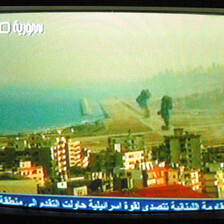The Times 9 August 2006

AYYAD AMMAR moved among the rescuers clawing through the ruins of a Beirut apartment block yesterday morning, holding up a photograph of his 14-year-old grandson and asking if anyone had seen the boy. Ahmed Kanj had gone to play computer war games in the internet cafe at the foot of the seven-storey building minutes before an Israeli missile struck.
A fireman told the old man finally that he had found the teenager’s broken body at daybreak. Mr Ammar bowed his head and began to weep as the crowd around him swore vengeance against Israel for the massacre on Hajjaj Street. The walking wounded and families searching for missing relatives began chanting the name of Sheikh Hassan Nasrallah, the Hezbollah leader, even though most who live here support Amal, a rival Shia group.
Diaa el-Husseini, 34, a market trader, who lived in the adjoining tower block, said: “We thought we were safe here so we stayed. We are not fighters. We are families who only want a peaceful life, but Israel wants to terrorise us all into leaving the southern suburbs of Beirut. Today we all feel part of the Hezbollah resistance.”
If Israel thought that by slowly strangling the life out of the Lebanese capital, by blockading it from land, sea and air, it would turn Christians against their Muslim neighbours it appears to have miscalculated. The tragedy on Hajjaj Street, which killed at least 31 and wounded 60, was Beirut’s single biggest loss of life since the war began, bringing the total to more than 1,000. It hardened the public mood. Even those in the Christian half of the capital, who were beginning to call for a ceasefire at any price, spoke yesterday of their disgust at what Israeli warplanes were doing to their city.
George Serrin, 42, a businessman, has no love for Sheikh Nasrallah and his militia, but said: “Of course I care for my family’s safety and want this war over now. But I am sickened at the needless ruination done to my city, our city.”
The blockades, fuel rationing, rising prices, power cuts and shortages in the shops affect all Beirut’s citizens.
There is a conviction shared by every community that Israel’s agenda is not solely to crush Hezbollah but to dismantle Lebanon, and particularly Beirut, just as the capital was starting to enjoy an economic and political renaissance. The criticisms of Fouad Siniora, the Lebanese Prime Minister, and of Hezbollah’s behaviour in the first days of the war by opposition figures such as Samir Geagea, the veteran Christian leader of the Lebanese Forces group, and the Druze chieftain Walid Jumblatt, are muted now as the Lebanese stage a deliberate show of unity.
The priority instead is to prevent Beirut’s frustration and anger developing into another civil war. This is a city that had spent millions marketing itself as this summer’s new Mediterranean playground, but now it feels more like a prison camp.
The damage inflicted on it is colossal. More than 70 bridges and 60 big factories have been destroyed. Fishing fleets have been sunk. Hospitals turn away patients for want of fuel, beaches are deserted and scarred by oil slicks from bombed fuel tanks. There is a pervasive sense of isolation.
With most nightclubs, bars, shops and cinemas closed and with few other distractions left to them, increasing numbers are turning to the internet to express their misery, hopes and worries. Contributors work by candlelight, their computers powered by batteries because much of the city is fortunate if it gets two hours of electricity.
One site, called Electronic Lebanon, has had 2.5 million hits. Antiwar petitions and cartoons are exchanged by e-mail, along with photographs of Lebanon’s dead and injured.
The bloggers also swap their black humour about how it feels to be Beiruti today. Khalid Fouwaz, 26, a US-educated computer analyst, who watched Condoleezza Rice at a press conference on President Bush’s Texas ranch tell Beirutis what they should do, said:
“Perhaps, if she can’t get us a ceasefire, maybe she can get some hay from George W. for our donkeys, as they will be the only way we will be able to move around our capital soon.”
Sidon Two people were killed and 15 wounded in an Israeli attack on the Palestinian refugee camp of Ain Al Hilweh in southern Lebanon, doctors said. Two shells fell near the home of Colonel Munir Maqdah, a chief of the Fatah movement in Lebanon, according to Palestinian sources. (AFP)
Related Links

